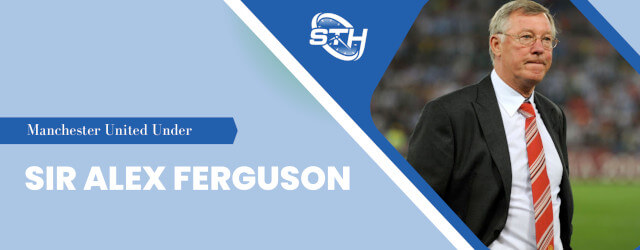Sir Alexander Chapman Ferguson is arguably the world’s greatest football manager. His success at the helm of Manchester United between 1986 and 2013 is the stuff of legend. During his reign, the club won 13 Premier leagues, 2 UEFA championships, and 4 FA Cups.
Sir Alex Ferguson’s work at Old Trafford turned the Red Devils into the global sporting monster we know today. The queen recognized his passion for soccer and excellent performance at Man United, leading to his knighting in 1999.
We’ll look at notable moments during his 26-year reign at Manchester United to better comprehend why Fergie's legacy might never be eclipsed.
November 6, 1986: Sir Alex Joins Manchester United
On this day, Ferguson, awkwardly sporting a bobble hat and scarf, came in to manage Manchester United. Unbeknown to many, his arrival would forever change the course of European football.
December 1989: Ferguson Almost Fired
Having suffered back-to-back losses against Everton, Norwich, Derby, Arsenal, and Millwall, Ferguson’s firing seemed inevitable. A banner hung at Old Trafford stating that after three years of excuses, Ferguson’s performance was crap, so it was “bye-bye” for him.
January 7, 1990: The Win That Saved Fergie
Much has been written about the FA Cup third-round match at City Ground on January 7, 1990. By then, things looked bleak for Ferguson, given the poor performance his boys had posted in previous games.
On this day, Manchester United went up against Nottingham Forest. The Reds won 1-0 and then went on to bag that season’s title.
This was a pivotal moment in Manchester United’s history. Before this, Man United had been trophyless for 4 years. It’s thus widely assumed that had the club lost this game, the board would have had no choice but to kick Sir Ferguson out.
It’s hard to visualize how different English football would have turned out had Fergie left Manchester in 1990.
Summer of 1995: Fergie’s Bold Choice of Signing Youngsters
In the summer of 1995, Sir Ferguson let go of Andrei Kanchelskis, Paul Ince, and Mark Hughes. The three stars were widely associated with the club’s success. In their place, Ferguson signed a new crop of young footballers, including David Beckham, Nicky Butt, Gary Neville, and Phil Neville.
Naturally, this bold move by Sir Alex sparked immense criticism. People like Alan Hansen told him that he needed to buy new players because there was no way he could win anything with kids.
Nonetheless, Fergie’s plan worked perfectly. By the season’s end, his so-called kids had won the double. And so it came to pass that Manchester’s success would depend on teenage tyros like Beckham, Ryan Giggs, Paul Scholes, Phil Neville, and Gary Neville.
April 27, 1996: Fergie’s ‘Mind Games’
Throughout the 1995/96 FA Cup league, it was largely assumed that Newcastle United would carry home the title. However, United beat Liverpool on the last day of the season, effectively stealing the cup from Newcastle.
Man U’s victory led to a meltdown by the then Newcastle manager, Kevin Keegan. Many, including Rafa Benitez, have often quoted his infamous ‘mind games’ rant.
May 26, 1999: Fergie’s Crowning Achievement
Fergie’s boys, Roy Keane, Andy Cole, and Dwight Yorke, were at their peak in 1999. To most people, Man U’s performance that year felt like an unfolding miracle that culminated with the team winning the unprecedented treble. To this day, Manchester United is the only English team to win the treble of the European Cup, domestic league, and domestic cup.
This moment has often been described as the zenith of Sir Alex Ferguson’s reign at Manchester United. A few months later, he would become Sir Alex Ferguson after being knighted by the Queen of England.
February 27, 2002: Fergie Won’t Retire
Sir Alex had declared that the 2001/02 season would be his last, after which he would retire. At the time, he was already the longest-serving manager in the English Premier League.
Nevertheless, he changed his mind and postponed his retirement (apparently, his wife prompted the decision).
August 12, 2003: Fergie Signs Cristiano Ronaldo
On this day, Fergie signed a scrawny 18-year-old Portuguese from Sporting Lisbon. Sir Fergie didn’t know this would be his most inspired transfer ever.
2007-2008 Season: Second Champions League
In the 2007-2008 season, Ferguson made some notable signings bringing Owen Harhreaves, Nani, and Anderson. Manchester almost won a second tremble that year. They won the domestic league and Champions League and played in the finals of the FA Cup. Unfortunately for them, Didier Drogba scored a late goal, and Chelsea won the FA Cup that year, denying them the second tremble. The following year, they also qualified for the grand finals of the Champions League but lost to Barcelona 2-0.
2010: Champions League Finals & New Technology
In 2010, United once again went all the way up to the grand finals of the Champions League, where they, once again, lost to Barcelona and got second place. The club also tried some innovations in the world of football. They acquired Aussie Rules player monitoring software from Sydney Swans. The software database was used to monitor the players' fitness, training, and medical information and create sustainable individual training programs and injury treatments.
April 2013: Bye Bye Fergie
Man United beat Aston Vila 3-0 to win their 20th league title. This stunning victory also marked the final hurrah for Manchester’s most successful manager.
Sports Team History takes a look at the history and the logo history of each and every professional sports team to have ever existed from the MLB, MLS, NBA, NCAA, NFL, NHL, Premier League, WNBA, XFL, ABA, AAF, or USFL.
Our partner site is Sports Logo History, which is a community of sports logo enthusiasts who enjoys the history of each team’s logo history. In addition, we have added Sports News History to our sports history websites. 24/7 non-stop sports news that's worth knowing. Finally, the premier sports team marketplace for your favorite team or college with thousands of items for you to peruse at Sports Market History.

